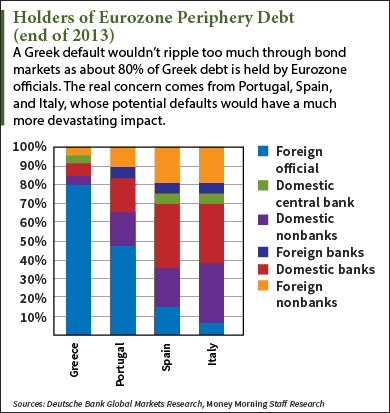A new bailout bill has been negotiated for Greece and a "Grexit" has been averted.
For now.
The reality facing the Eurozone and Greece right now is that even with this new bailout package, Greece is not out of the woods. And a Greek expulsion or voluntary exit from the euro - the dreaded "Grexit" - will continue to color discussions about the European Monetary Union until the Greek debt crisis is over.
This new bailout will not end the Greek debt crisis. Five years and 240 billion euros ($264 billion) have only deepened the economic crisis plaguing Greece. When the crippling austerity attached to this bailout loan is employed, labor will continue to either migrate or see its wages squeezed.
The crisis born out of the first two bailouts will only be accelerated until Greece becomes a failed state - a debtor colony for which the rest of Europe, not to mention China and Russia, are free to plunder for raw materials.
This is what will become of Greece. There is no economy. And the political sphere is so out of touch with the Greek people that politics in the Hellenic Republic are essentially dead.
This is not a country poised for growth. A hollowed out, debt-ridden ward of the Eurozone won't be able to pay off this next tranche of bailout loans.
And when Greece is forced to confront the Eurogroup, hat in hand next time, you can be sure that talks of a "Grexit" will only intensify.
While the Greek tragedy threatens to tear at the fabric of Greek society, the reality is, Greece is a rather small country.
It comprises 2% of the Eurozone economy.
It is certainly a sad story, but all things considered, whatever the final outcome of Greece becomes, it won't leave much of dent on the broader world economy.
So, what would a "Grexit" mean for investors?
Here's how to prepare for what may very well be an inevitable departure of Greece from the European Union.
An Update on the Greek Debt Crisis
Despite a lot of hope that the arrival of the Syriza party would mean an end to broader Eurozone financial aggression in Greece and an end to austerity, Syriza seemed to be all talk.
In the end, Prime Minister Alexis Tsipras didn't have the ability to reconcile his campaign promises to end austerity while also staying in the euro.
He capitulated this week.
 And Greece sank right back into the trap of accepting bailouts in exchange for the same austerity that further impoverished Greece in the first place.
And Greece sank right back into the trap of accepting bailouts in exchange for the same austerity that further impoverished Greece in the first place.
But for all the fears and market volatility tied to the Greek debt crisis in the run-up to this settlement, it seems the impact of a Greek default, or a Grexit, from an investment standpoint is limited.
And after two economic adjustment programs, the distribution of sovereign Greek debt ownership has largely moved to official financial institutions and away from private bondholders.
"Almost all of the Greek bonds are held by official agencies," Michael Hudson, distinguished research professor of economics at the University of Missouri-Kansas City, told Money Morning. "So it's not going to affect the bond markets. Maybe there will be a few vulture funds that try to sue, but there's hardly any of this Greek debt in the public's hands, it's all in officials' hands. So, none of this will cause more than a ripple."
The crisis to come from this will not be economic - it will be political. Should Greece have its debt written down, or should a Grexit happen - and one or both will have to happen - then it's going to sour investors on this ambitious project of European monetary integration.
This is a project more than 60 years in the works, which can trace its roots back to Charlemagne.
It's going to be exposed for the failure that it is. Greece could very well recover if it defaults or exits. And that sends the message to Italy, Portugal, and Spain - much larger debtor nations - that the euro only serves to empower Germany's deflationary economy to the detriment of the periphery.
The Greek Debt Crisis and the Euro
As discontent begins brewing at a political level, investors will begin selling euros to buy other currencies, driving the euro down on world foreign exchange markets.
[epom key="ddec3ef33420ef7c9964a4695c349764" redirect="" sourceid="" imported="false"]
It's been happening since March 2014. After closing at a high of $1.3934 in that month, the euro has fallen 21% to just above $1.10.
Make no mistake: Currency traders are going to drive this down to euro-dollar parity in the long term. This means there are still at least 9% gains on the table.
A "Grexit" or a Greek default, or even a broader Eurozone political crisis, only presents an opportunity to short the euro.
And if you'd rather stay out, you can take solace in the fact that other than some routine market volatility, the Greek debt crisis won't do much to dampen your portfolio given Greece's relative size to the Eurozone.
Jim Bach is an Associate Editor at Money Morning. You can follow him on Twitter @JimBach22.
Exactly How Much Does Greece Owe? We break that down here...


